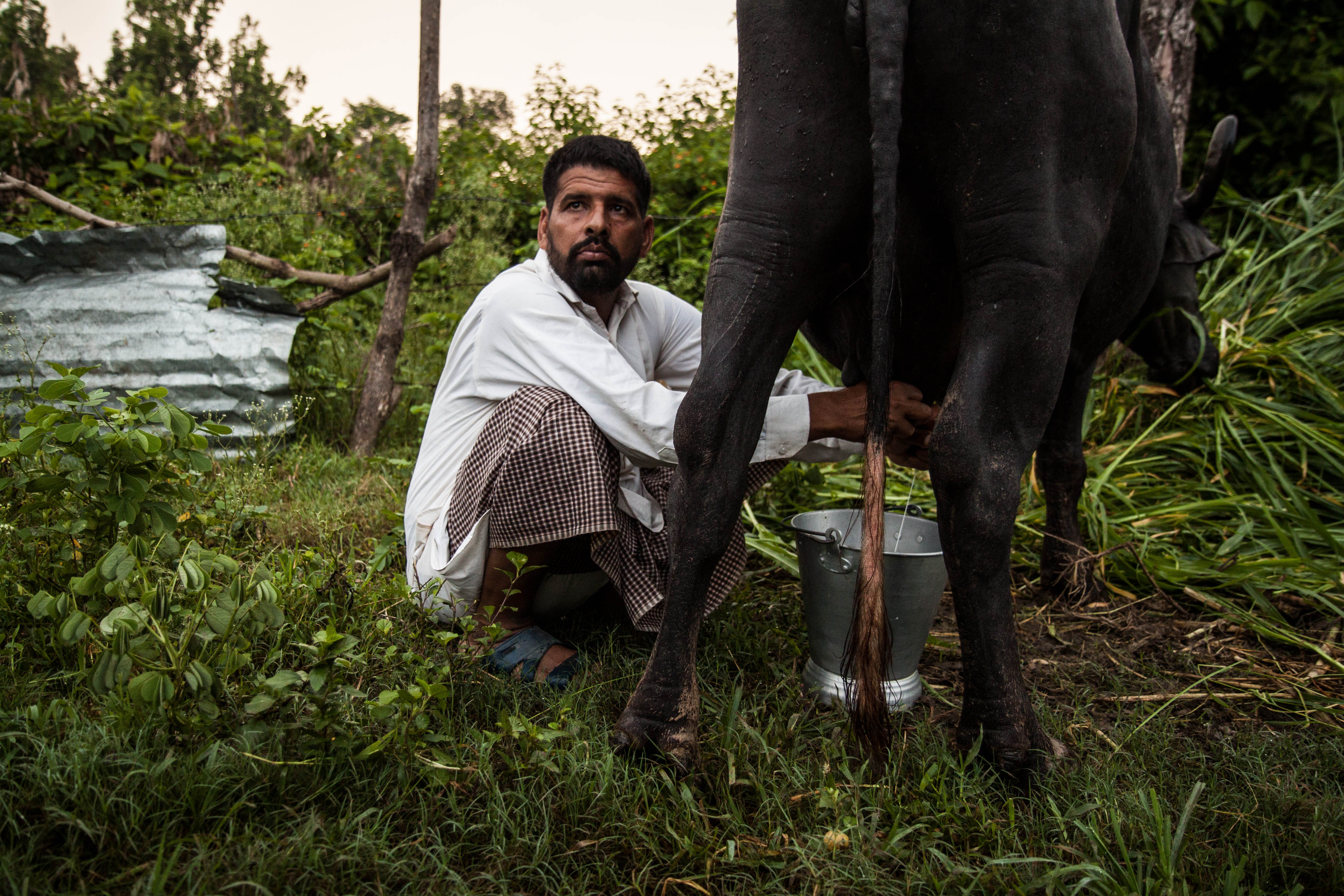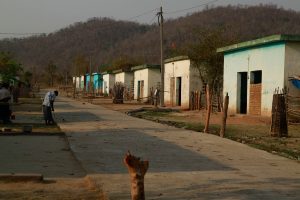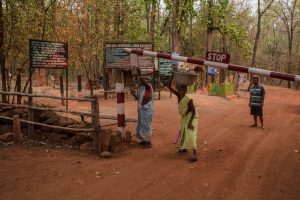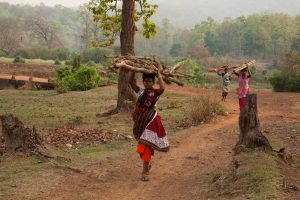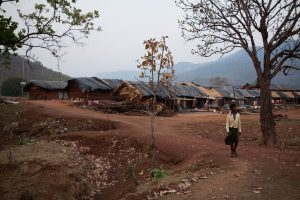First published on 03/16/2018, and last updated on 03/03/2021
Relocation was found to be either ongoing or planned in at least twenty three Protected Areas
By Neema Pathak Broome (Kalpavriksh, ICCA Consortium Member) and Regional Coordinator for South Asia; and Eleonora Fanari (Kalpavriksh)
On 29th September 2017, at the inauguration of Global Wildlife Plan (GWP), the Union Minister for the Ministry of Environment, Forests and Climate Change (MoEFCC) claimed that “India is playing a leadership role in management of wildlife through involvement of local communities” and that “five crore people living around national parks and sanctuaries are working as partners in environment conservation”. This is a wonderful dream and vision that India’s conservation scenario desperately needs. Fortunately there are now legal provisions which can make this dream come true. Yet, unfortunately this statement is in stark contradiction to the situation on the ground. The local communities living in and around Protected Areas (PAs) remain excluded; their rights and dignity continuously violated; livelihoods disrupted; often relocated under coercion, without consent and with highly dissatisfactory package and facilities at the new site; or simply evicted without any notice. Lathi charge, tear gas, rubber bullets, guards with guns, police force; earth moving machines and elephants are often the setting at eviction sites… reminiscent of colonial times.
November 27, 2017 over 700 local tribal families were evicted from their homes situated on the fringe of Amchang Wildlife Sanctuary (WLS) in Assam, many brutally beaten up. Forest officials escorted by over 3000 jawans of Assam Police used elephants and bulldozers to destroy their houses. All this despite a petition filed against their eviction, ordered by the Guwahati High Court in August 2017. These flood affected landless people were applicable for a rehabilitation package under Assam Special Scheme for Rehabilitation of Erosion Affected Families but instead were left homeless to struggle through the cold winter nights without any notice, dialogue, discussion, or compensation.
Similar scenario was playing out in Rajaji Tiger Reserves (TRs) in Uttarakhand where 300 van gujjar families were evicted in an inhuman manner… children, women, and elderly left by the side of the road to shiver. While the Field Director argued[1] that these families are forest encroachers, the local people claim that they are local inhabitants whose names were erroneously not included in the list of people to be relocated and compensated prepared in 1998. A few kilometres away in Ramnagar block within the buffer zone of Corbett National Park (NP), the houses of van gujjar families were destroyed without any notice or explanation and people beaten up by the forest officials. Some of them continue to face harassment and false cases while their private and common property rights are denied[2].
Earlier in 2017, 40 families from Satkosia TR in Odisha were evicted without any consultation or compensation. Even as we write this article dozens of adivasi and dalit people sit on a dharna in Barnawapara WLS in Chhattisgarh, demanding action[3] against a forest officer engaged in unprovoked violence against the local villagers. These families who were not relocated under some disputes when the rest of the village was forcefully relocated[4], have seen in last few years their employment opportunities eliminated, schools broken down, and access to development benefits denied… to force them to leave their homes. Incidents of people being evicted, or coerced and forced to relocate are pouring in from across the states, including Wayanand in Kerala, Bhoramdeo in Chhattisgarh, Chandaka-Dompara and Debrigarh in Odisha, among others.
Existing legal provisions on relocation from PAs
Similar brutalities impacting nearly 3 million tribal families in 2002 were triggered by a letter issued to the chief secretaries of all states by the MoEF, directing them to evict all ‘encroachments’ in a time bound manner[5]. Subsequent local adivasi struggles and a national campaign by various adivasi networks and sangathanas led to the Parliament of India enacting the Scheduled Tribes and Other Traditional Forest Dwellers (Recognition of Forest Rights) Act 2006 or FRA[6].
Among the various provisions related to land and forest rights, denial of which has led to historic injustice faced by scheduled tribes (STs) and other traditional forest dwellers (OTFDs), section 4 of FRA details out conditions and processes under which relocation can take place from forest areas. It states that no forest rights holders shall be resettled or have their rights affected for the purposes of creating inviolate areas for wildlife conservation, except when it has been scientifically established that their activities or presence is causing irreversible damage and threatening the existence of wildlife and their habitat. In the same year the Wild Life Protection Act (WLPA) was also amended to include these guidelines, stating clearly that relocation can take place only after it has been established with the consent of the concerned communities that their presence and activities cause irreversible damage and threaten the existence of tigers and co-existence of these communities with tigers is not possible. Both laws make the follwing conditions mandatory for relocation, a) it has been established scientifically that co-existence is not possible, b) the process of recognition and determination of rights under FRA has been completed, c) free, prior, informed consent of the gram sabhas has been sought in writing, d) relocation is voluntary and on mutually agreed terms and conditions e) resettlement package has been prepared and is to the satisfaction of the people being relocated.
The National Wildlife Action Plan (WLAP) 2017 – 2031, also asks for speedy recognition of forest rights of communities living inside TRs, emphasising that long delays in the settlement of forest rights and the payment of compensation have been “a major source of alienation of the local people from wildlife conservation”. It envisages a review of the past cases of relocation from PAs and TRs by 2019 towards developing future strategies for relocation and stresses that relocations in fiture should be only if essential and based on willingness and not force. These provisions are in keeping with India’s conservation commitments under the Convention on Biological Diversity (CBD), whose various decisions promote “…full and effective participation of indigenous and local communities, and also their prior and informed consent to or approval of, and involvement in, the establishment, expansion, governance and management of PAs…”[7].
Forced by the adivasi struggles but not always liked by hardline conservationists, these provisions indicate a shift in the way conservation is being (and should be) envisioned in post colonial India… based on co-existence rather than conflict; respect for fundamental human rights & responsibilities; justice in distribution of conservation costs & benefits; and most importantly envisioning relocation only in exceptional situations rather than essential for wildlife conservation.
Continued relocation, eviction and atrocities –in violation of legal provisions
In 2017 a survey was carried out by Kalpavriksh as part of Community Forest Resources Rights Learning and Advocacy Process (CFRLA) in 30 PAs (22 TRs, and 8 WLS & NP) to understand the extent to which the legal provisions were being implemented on the ground.
The survey found few PAs where rights under FRA were fully and effectively recognized. In most cases people were not even aware of such rights. In some cases only one out of 13 kinds of rights under FRA (namely individual land rights) was recognized suo moto, facilitated by the forest department without following legal procedures, mainly to complete legal requirement for relocation. Simlipal TR in Odisha is one of the few which has recognized land and community forest rights. However, the communities whose right, including rights to use, manage and conserve their forests or Community Forest Resource Rights (CFRs) were recognized, have subsequently been relocated. Even as they were preparing management plans for their CFRs! The Kharia– a particularly vulnerable tribal group (PVTG) – was relocated in December 2016 from Khejuri village in the buffer zone. “After having received the CFRs we got funds under MNREGA to build a road… the forest department came and destroy all the work saying that this is a PA and we are not anymore allowed to stay” commented an obviously shocked local man from the village.
Relocation was found to be either ongoing or planned in at least twenty three Protected Areas. In most cases FRA and WLPA provisions mentioned above were not being followed. In no PA, barring some in Simlipal, any efforts towards co-existence had been made by the forest department. No records were found of any scientific studies to prove that co-existence was impossible, neither had there been any consultations with the local communities on co-existence.
People from Amchang, Kaziranga, Rajaji and Manas were found to have been outright evicted (from lands which they owned or they were claimants under FRA) without any rehabilitation or compensation. In their response the forest department maintained that there are no evictions and all relocations are ‘voluntary’. The director general of the National Tiger conservation Authority (NTCA) said in a statement “We are only relocating those people from core tiger habitats who are willing to move; there are no evictions“. In reality, such ‘voluntary’ relocations were often found to be forced or coerced under pressure or threat. In Achanakmarg, Nagarhole, Simlipal, Barnawapara , Chondaka and Debrigarh people reported, forest offenses filed against them, physical threaten, denial of access to basic health and education facilities and livelihood, making existence impossible. The process of seeking gram sabha consent was also found to be fraught with irregularities and often deceit, such as, getting individual signatures on blank papers (Khejuri village relocated from Simlipal TR); signatures taken by going from house to house instead in a gram sabha (Achanakmar TR). In PAs like Rajaji and Kailadevi reported inconsistencies in the lists of families to be relocated and compensated. Some families were not recorded, particularly women headed families or single women; lists were made long before the actual relocation was carried out, not including names of those who in the meanwhile became adults. In many PAs including Simlipal, Achanakmarg the facilities at the relocation site were found to be highly dissatisfactory and sometimes non-existent.
Illegal NTCA order and CWH guidelines
To make the matters worse the NTCA, overstepping its jurisdiction and in violation of FRA, issued a letter cum order on 28 March 2017, stating ‘no recognition of rights’ to be granted in TRs till guidelines for the notification of critical wildlife habitat (CWH) are issued. This brought an absolute halt to the already limited implementation of the FRA in the TRs. In Tadoba the CFR claims of about seven villages had been accepted and were about to be distributed by the Collector when the NTCA order came. The villagers were beginning to prepare their management and conservation plans with a focus on eco-tourism hoping to benefit from the TR. Understandably disturbed villagers see this as a conspiracy to sustain corporate tourism supported by forest department, while relocating the local villagers and denying their rights. The NTCA order has been widely criticised[8] and Survival International, a UK based organization declared it ‘an attack on India’s tribal peoples’ and called for a boycott of tourism in TRs in India till the order is withdrawn.
In the meanwhile on 4th of January 2018 the MoEFCC has issued a set of guidelines for declaration of CWH under section 2 (b) of the FRA. There are widespread fears that given the situation on the ground the processes which will now start towards declaration of CWH will only intensify the above mentioned injustices and atrocities unless accountable monitoring systems are put in place to ensure that existing legal provisions are strictly followed in letter and spirit. These fears emanate from the manner in which ‘inviolate’ has been understood and used in the context of CWH i.e. ‘absolutely free of human presence’. The only exception to this has been a group of conservation organisations who have argued that inviolate should be understood as ‘no human activity or minimal human activity which doesn’t threaten species or ecological communities’ and thus allows for use, management and livelihoods rights of the local people.
Why is the Ministry of Tribal Affairs silent?
It is indeed surprising that the Ministry of Tribal Affairs (MoTA), the nodal agency for implementation of the FRA and vested with the responsibility to ensure justice to tribal and non tribal forest dwelling communities has remained largely ineffective in addressing these blatant violations of the rights of STs and OTFDs, including PVTGs. Instead of demanding an immediate withdrawal of the NTCA order, the MoTA on 29 May, 2017 merely issued a letter to the MoEFCC stating that it considers the NTCA order as a ‘temporary measure’ and requests the Minister to initiate the due process of issuing the guidelines for notifying CWH at the earliest. On the 2nd of January 2018, the National Commission on Scheduled Tribes (NCST) called for a meeting to discuss the NTCA order. From the minutes of this meeting it appears that even for the NCST these fundamental violations of the rights is merely an issue of ‘inadequate compensation’, which can been addressed by doubling the compensation package! Neither the MoTA nor NTCA have questioned the rationale for the relocation itself, their forced nature, the atrocities being carried out, lack of recognition of rights under FRA, and absolute lack of co-existence strategies.
The way forward
Given the crisis on the ground what needs immediate review in the country is the very basis of relocation from PAs and relocation and eviction based model of conservation. The injustices, atrocities, and non recognition of people’s legal rights and responsibilities, including the right to govern and manage their customary forests, if not addressed immediately, is likely to have serious long term impacts for wildlife conservation itself by creating a political constituency against conservation and by forcing people to engage in activities detrimental for wildlife. It is essential that:
The MoTA and MoEF ensure a) immediate withdrawal of the NTCA order, b) ALL ongoing/and proposed illegal relocation and evictions from PAs are stopped immediately, c) NO relocation is carried out till a participatory review of past relocations and evictions is done and an effective and inclusive monitoring system is put in place to ensure that all legal requirements are followed.
For situations where relocation may be necessary and consented without coercion, force or farce the relocation package is revised based on the National Land Acquisition Rehabilitation and Resettlement Policy 2013; ensuring ALL customary and recognized forest rights of the communities being relocated are reinstated (in proportion with the existing rights) at the new location, without affecting the rights and with the consent of existing rights holders. Cash compensation must be in addition to and not in lieu of any individual and community land and forest rights.
Finally and most importantly, in accordance with FRA and WLPA, immediate steps need to be taken towards building and strenghtening co-existence of human and wildlife communities in all forest landscapes, including PAs. The first step towards this is recognition of all forest rights as per FRA and use of section 5 of FRA which empowers the gram sabhas to protect wildlife, forest, biodiversity and their own habitats from any destructive practices affecting their cultural and natural heritage. FRA rule 4 (1) e and f directs the gram sabhas to constitute a committee to fulfil the above mandate and work out conservation and management strategies for their CFRs. These plans are required to be incorporated in the overall management or working plan of the forest department including in PAs. Supporting gram sabhas in getting their rights recognised and in discharging their conservation responsibilities; along with taking strong measures to ensure that no more forests are diverted for mining, river linking, Industrial corridors, highways and urban expansions will ensure long term security of wildlife and that of ecologically and culturally sensitive areas both inside and outside PAs, far more than evictions and relocations could ever achieve.
- Bokrakachaar evicted in 2009 from their ancestral land for the creation of the Achanakmar Tiger Reserve. In 2009 249 families have been moved from their ancestral land to this place. They got as compensation some concrete houses and barren land. Now they migrate outside in search of work.
- Women leaving the gate of the entry of Simipal Tiger Reserve in Odisha, after the collection of mahua flowers.
- Santhal women carrying the firewood in the buffer area of Simlipal Tiger Reserve, Odisha.
- Khonduador relocated camp of 47 Khadia primitive tribal families, relocated on December 2016 from their ancestral Kejuri village, located in the buffer area of Simlipal Tiger Reserve.
[1] https://timesofindia.indiatimes.com/city/dehradun/shifting-of-van-gujjars-from-rajaji-reserve-begins/articleshow/61799253.cms
[2] https://thewire.in/224046/no-country-pastoralists/
[3] https://counterview.org/2018/02/01/stop-forceful-eviction-and-atrocities-against-tribal-families-of-chhattisgarh-wildlife-sanctuary/
[4] https://timesofindia.indiatimes.com/city/delhi/chhattisgarh-tribals-oppose-relocation-from-barnawapara-forest/articleshow/61470213.cms
[5] http://www.prsindia.org/uploads/media/1167469383/bill53_2007010353_Nac_note_on_tribal_eviction.pdf
[6] http://www.ippg.org.uk/papers/dp39.pdf
[7] https://www.iccaconsortium.org/wp-content/uploads/2016/11/publication-Recognising-and-Respecting-ICCAs-Overlapped-by-PAs-Stevens-et-al-2016-en.pdf
[8] https://thewire.in/136976/forest-rights-dwelling-communities/
This article has been written as part of Community Forest Resource Learning and Advocacy Process (CFRLA). The authors are grateful for the information and analysis shared by a number of people from different PAs mentioned in the article and others associated with CFRLA.
